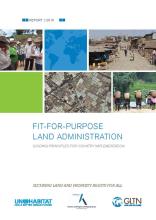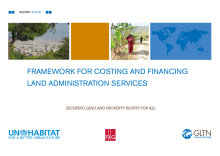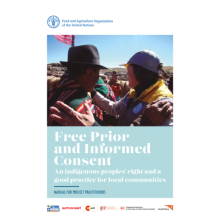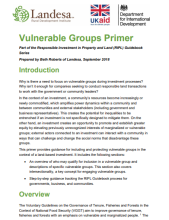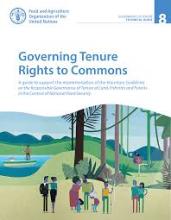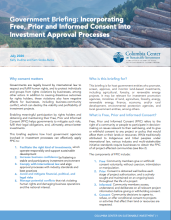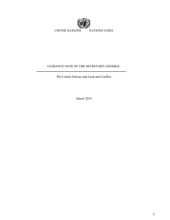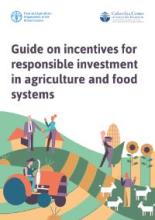Resources for Government
Fit-for-Purpose Land Administration: Guiding Principles for Country Implementation
The guide proposes guiding principles to build Fit-For-Purpose land administration systems in order to deliver benefits, including secure tenure rights, to a wide range of stakeholders. It provides structured guidance on building the spatial, legal and institutional frameworks in support of designing country-specific strategies for implementing FFP land administration. It contains the analysis and operational advisory guidelines to implement the approach.
Framework for Costing and Financing Land Administration Services (CoFLAS)
The tool presented in this guide aims to assist policy-makers and land administrators to adopt appropriate technologies and methodologies for land administration services more efficiently, cost effectively and with options most appropriately tailored to national and sub-national contexts. It was developed after recognizing the need to modernize the budgetary approach to land agencies and to provide effective, cost-efficient, affordable and sustainable services, particularly in developing countries. Countries seeking to modernize land administration services often face large and immediate costs to first achieve broad geographic coverage, and then to establish the supporting records, procedures and personnel capacity.
Free Prior and Informed Consent - An indigenous peoples’ right and a good practice for local communities
This manual is designed to assist development organizations to respect the right to FPIC when developing and implementing projects affecting Indigenous Peoples. It contains a six-step procedure to facilitate the FPIC process while showing its benefits, as well as provides the regulatory framework to be used when mainstreaming Indigenous Peoples’ rights within organizations’ policies and standards.
Free, Prior and Informed Consent Primer (Responsible Investment in Property and Land (RIPL) Guidebook Series)
This guide is directed at governments and companies seeking information on implementing FPIC principles in investment operations to safeguard the land rights of project-affected communities. It describes the key elements of FPIC, details steps that need to take place to ensure compliance with FPIC and lists additional resources that business enterprises can consult for further guidance on how to adhere to the principles of FPIC.
Getting From Ideas to Reality: Building Political Support to Translate Good Ideas Into Actual Practice
This document focuses on how government officials can improve the governance and practice of responsible land-based investment by building stronger political support.
Governing land for women and men: A technical guide to support the achievement of responsible gender-equitable governance of land tenure
The guide focuses on equity and on how land tenure can be governed in ways that address the different needs and priorities of women and men. It moves away from long-standing debates about gender equality in access to land, towards the mainstreaming of gender issues to achieve more gender-equitable participation in the processes and institutions that underlie all decision-making about land.
Governing Tenure Rights to Commons
This guide aims to support states, community-based organizations, civil society organizations, the private sector and other relevant actors, to take proactive measures to implement the standards and recommendations of the Voluntary Guidelines on the Responsible Governance of Tenure (VGGT). The goal is to achieve legal recognition and protection of tenure rights to commons and community-based governance structures.
Government Briefing: Incorporating Free, Prior and Informed Consent (FPIC) into Investment Approval Processes
This briefing explains how host government agencies involved in investment processes can effectively apply FPIC to:
1. Facilitate the right kind of investments, which operate responsibly and support sustainable development
2. Increase business confidence by fostering a stable and participatory investment environment
3. Comply with international law and align approval processes with industry standards and best practices
4. Avoid and mitigate financial, political, and legal risks
5. Manage potential conflicts that risk violating human rights and damaging business operations and the national interest.
GUIDANCE NOTE OF THE SECRETARY-GENERAL
The UN Framework for Action in this Note helps to identify potential entry points to integrate land in conflict analyses, planning and assessment processes, supports engagement of UN leadership and outlines key activities to consider in areas of UN work - such as support to peace agreements and mediation, human rights, gender equality, rule of law and governance. This Note provides guidance on partnership and the use of practical tools for analysis, coordination and programming.
Guide on incentives for responsible investment in agriculture and food systems
Increased investment in agriculture and food systems—from both the private and public sectors—is critical to enhance food security and nutrition, reduce poverty, and adapt to climate change. To generate sustainable benefits, this investment must be responsible. What role should investment incentives play in encouraging such investment? This Guide helps to answer that question. Specifically, the Guide provides policymakers and government technical staff with guidance on how investment incentives can be used (and how they should not be used) to enhance responsible investment in agriculture and food systems. The Guide provides an overview of responsible investment in agriculture and food systems; examines common types of incentives; offers general considerations on how incentives can be used; and discusses how to plan for, design, monitor, and evaluate investment incentives for responsible investment in agriculture and food systems.


